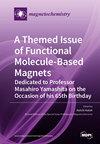TiO2纳米粒子表面和核心铁离子的磁性和电子态
IF 2.5
4区 化学
Q2 CHEMISTRY, INORGANIC & NUCLEAR
引用次数: 0
摘要
本文利用磁强计、电子顺磁共振(EPR)和穆斯堡尔谱研究了铁在TiO2纳米颗粒表面或核心的电子和磁性状态。研究表明,具有铁原子的TiO2样品的EPR光谱位于特定特征的表面和核心,这取决于纳米颗粒的组成和尺寸。使用密度泛函理论(DFT)方法的理论计算表明,与TiO2纳米颗粒的核心相比,Fe原子在表面上的定位具有相当大的一组原子构型。表面和核中掺杂有Fe原子的样品的穆斯堡尔谱可以分别用两个和三个具有不同四极分裂的双原子来非常令人满意地描述。这可能表明颗粒表面和本体中的Fe原子处于不同的局部环境中。发现表面和核心的所有铁离子都处于Fe3+高自旋状态。本文章由计算机程序翻译,如有差异,请以英文原文为准。
Magnetism and Electronic State of Iron Ions on the Surface and in the Core of TiO2 Nanoparticles
In this paper, the electron and magnetic state of iron placed either on the surface or in the core of TiO2 nanoparticles were investigated using magnetometric methods, electron paramagnetic resonance (EPR) and Mössbauer spectroscopy. It was demonstrated that the EPR spectra of TiO2 samples with iron atoms localized both on the surface and in the core of specific features depending on the composition and size of the nanoparticles. Theoretical calculations using the density functional theory (DFT) method demonstrated that the localization of Fe atoms on the surface is characterized by a considerably larger set of atomic configurations as compared to that in the core of TiO2 nanoparticles. Mössbauer spectra of the samples doped with Fe atoms both on the surface and in the core can be described quite satisfactorily using two and three doublets with different quadrupole splitting, respectively. This probably demonstrates that the Fe atoms on particle surface and in the bulk are in different unlike local surroundings. All iron ions, both on the surface and in the core, were found to be in the Fe3+ high-spin state.
求助全文
通过发布文献求助,成功后即可免费获取论文全文。
去求助
来源期刊

Magnetochemistry
Chemistry-Chemistry (miscellaneous)
CiteScore
3.90
自引率
11.10%
发文量
145
审稿时长
11 weeks
期刊介绍:
Magnetochemistry (ISSN 2312-7481) is a unique international, scientific open access journal on molecular magnetism, the relationship between chemical structure and magnetism and magnetic materials. Magnetochemistry publishes research articles, short communications and reviews. Our aim is to encourage scientists to publish their experimental and theoretical results in as much detail as possible. Therefore, there is no restriction on the length of the papers. The full experimental details must be provided so that the results can be reproduced.
 求助内容:
求助内容: 应助结果提醒方式:
应助结果提醒方式:


